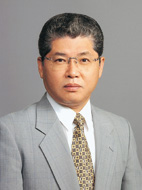Towards Specialized Research and Education Focusing on Achieving Asian Economic Integration

Satoshi Amako
The aim of GIARI is to produce outstanding graduates, specialists in their fields, equipped with comprehensive and sophisticated knowledge, able to contribute to the realization of regional interests, a newly emerging concept that goes beyond the traditional notion of national interests. GIARI is also intent on establishing itself as a world-leader in the promotion of Asian integration, while working to find solutions for many of the serious problems that the Asian region faces.
Asian integration is already a reality; it is happening, unprompted, right now. Greater regional cooperation on such issues as the environment and large-scale natural disasters is occurring organically. At the same time, however, the Asian region holds within it diverse obstacles to mutual cooperation, such as differences in political structure and the level of economic development, religious and lifestyle differences, and mutual animosity rooted deep in history. The result is that systematic Asian integration is still failing to achieve all that it could.
Another factor is that, whilst regional integration and collective initiatives may be increasingly popular, the region still lacks a clear center for integration, a hub where theoretical research is developed and valuable human resources nurtured. Consequently, there is no meaningful, organic collaboration between research and education; yet such collaboration is vital, with both theoretical research on Asian integration and the training of competent human resources key to successful integration.
GIARI was established in September 2007; we are currently moving into our third year. The GIARI approach is founded on a methodological basis in politics, economics and social studies. Much of our work focuses on the development of the GIARI model, an innovative and comprehensive research approach which is considerate of the stratification and complexity of inter-regional Asian areas. Theoretical findings from the GIARI model are then used to construct the GIARI method, a new educational curriculum. The GIARI model is based on key concepts pertaining to research area and approach, namely
- political integration and identity
- economic integration and sustainability
- social integration and networking
The findings and achievements of the GIARI model will be systemized into a "3x3 matrix" based on these three key concepts; this matrix in turn will feed back into the educational concepts of the GIARI method. The resulting structure, combining practical education and training for students and the development and support of groundbreaking theoretical research will be quite unique throughout Asia. It will also form the fundamental framework for future GIARI activities.
The Graduate School of Asia-Pacific Studies lies at the core of GIARI. It is the largest independent graduate school in the world to deal specifically with Asia-Pacific regional issues. Education is provided bilingually, in English and Japanese; this bilingualism is a specific strength of the program, alongside its strong foundation in interdisciplinary Asian research. Here at GIARI, our aim is to create a pioneering center, internationally unrivalled, of research and education on Asian integration, and all of our activities are focused on achieving this goal.
Dec. 2009
